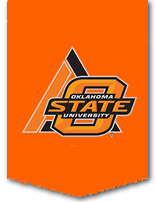Landfill Ladies work toward solving real-life issues
While most Oklahoma State University students were cramming for final exams over the last few weeks of the semester, some upperclassmen in OSU’s Department of Biosystems and Agricultural Engineering were preparing to give presentations to an auditorium full of their peers, professors and industry professionals.
Paul Weckler, BAE professor, teaches the senior design course sequence. In the yearlong class, students are responsible for developing engineering solutions for clientele with real-life problems.
The design course is the BAE Department’s capstone course, a culmination of the students’ undergraduate program. During the summer, Weckler spends time visiting with private companies and government agencies to identify potential clientele-based engineering problems that could be solved by BAE seniors.
The potential clientele are provided an overview of what it is like to work with senior design teams and their willingness to interact with students over the next 8-9 months is assessed. Early in the fall semester, Weckler presents the potential projects to students and he works with the students to form project teams that best align student interests.
This class is always different because the projects and students are always different. Sometimes the class deals with machinery projects, other times they might be dealing with environmental projects, or food processing projects. Many of the projects have come through the OSU Application Engineers Program, which provides engineering assistance to small rural manufacturing companies.
“While it’s time consuming for me, as an educator, it’s also very enjoyable, challenging and rewarding,” Weckler said. “It’s a win-win-win situation, and the winners are OSU students, Oklahoma businesses and government agencies, the state's economy and rural economies in particular.”
One group of students, the self-proclaimed “Landfill Ladies,” took on a project in collaboration with the City of Enid and the Oklahoma Department of Environmental Quality, working on solving some of the erosions issues the local landfill was having.
“There is a problem with erosion at the City of Enid Municipal Landfill and we are having an issue getting anything to grow on our side slopes at the landfill,” said Barry Brummit, environmental specialist for the city.
Katie Schlotthauer, Christian Ley, Hannah Blankenship and Amethyst Kelly adopted the project as their own and began working toward a solution during the fall 2016 semester. As this problem is not unique to the City of Enid, the team dug into previously conducted research to get an idea of what other communities have tried.
They decided to divide their test area into equal sizes and run several different tests against a control plot, which was left alone with no treatment. Each area featured a different way of trying to slow erosion so that grass could grow on the slope and help reduce erosion.
Not surprisingly, the test plot finished at the back of the pack, while the most successful plot incorporated a compost blanket laid over the entire area. While the team’s time was short at the landfill, they did see some grass grow, which was encouraging to the city.
“I thought the women did a marvelous job in the short period of time that they had to complete this project,” said Brummit. “The Oklahoma Department of Environmental Quality would like to extend the project into the next school year.”
That very well may be a possibility, as this class will continue well into the future.
###
REPORTER/MEDIA CONTACT:
Sean Hubbard
Communications Specialist
Agricultural Communications Services
157 Agriculture North
Oklahoma State University
Stillwater, OK 74078
Fax: 405-744-5739
Email: sean.hubbard@okstate.edu


